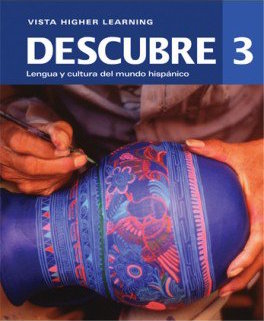
All Solutions
Page 83: Practica
The outlier word is **calentar**, heating- the rest are cleaning actions.
The outlier word is **auténtico**, authentic- the rest are time expressions.
The outlier word is **soler**, to tend to- the rest are household items or places.
The outlier word is **a tiempo**, on time- the rest are actions.
The outlier word is **apagar**, turn off- the rest are expressions related to routine.
The outlier word is **quitar el polvo**, dusting- the rest are expressions of price.
The outlier word is **soledad**, loneliness- the rest are expressions about house chores.
The outlier word is **barrer**, sweeping- the rest are expressions related to daily things.
* **a diario**: daily (adverb)
**a tiempo**: on time
**cotidiano**: daily (adjective)
**en aquel entonces**: then / back then
**horario**: time
**por casualidad**: by chance
**soledad**: loneliness
**soler**: tend to
*Julián and María met one day ____ in the supermarket.*
The most appropriate expression is **por casualidad**, by chance.
*Julián was very happy about having met María because, ____, he was new in the neighborhood and didn’t know anyone.*
The most appropriate expression is **en aquel entonces**, back then.
*He doesn’t like ____.*
The most appropriate expression is **soledad**, loneliness.
*Since that day, they see each other almost ____.*
The most appropriate expression is **a diario**, daily.
*During the week, they ____ meet for a coffee after work, because they both have similar ____.*
The most appropriate expressions are **suelen**, tend to, and **horarios**, times.
|1:00 |Do errands |
|–|–|
|2:00 |Pick up new debit card |
|3:00 |Mall: buy dress |
|4:00 |Supermarket: chicken, rice, vegetables |
|5:00 | Clean up |
|6:00 |Cook, lay the table |
| 7:00|Get ready |
|8:00 |Date with Carlos |
* *¿A qué hora va a comprar el vestido?*
At what time does she buy the dress?
*Ella quiere comprarlo a las tres, pero no llega hasta las cuatro.*
She wants to buy it at three, but she doesn’t get there until four.
* *¿A qué hora va al supermercado?*
At what time does she go to the supermarket?
*Ella planea ir al supermercado a las 4, pero lo hace a las 5:30.*
She plans on going to the supermarket at 4, but she goes at 5:30.
* *¿A qué hora hace la limpieza?*
At what time does she clean up?
*Sara quiere limpiar a las cinco, pero limpia a las 5:45.*
Sara wants to clean up at five, but she cleans up at 5:45.
* *¿A qué hora cocina?*
At what time does she cook?
*Sara planea cocinar a las seis, pero no llega a hacerlo hasta las 7:30.*
Sara plans on cooking at six, but she just gets to do it at 7:30.
* *¿A qué hora se arregla?*
*Sara quiere arreglarse a las siete, pero no llega a hacerlo.*
Sara wants to get ready at seven, but she doesn’t make it on time.
You could write:
* **Carlos**: *¡Sara! ¿Te olvidaste de nuestra cita?*
**Sara**: *¡Dios mío, Carlos! No, no podría olvidarme. Llegué muy tarde a mi casa, y sólo pude cocinar. Lo siento mucho. Entiendo si quieres irte.*
**Carlos**: *¿Cocinaste para mí?*
**Sara**: *Sí, preparé un pollo con arroz.*
**Carlos**: *Tranquila, puedo esperarte si quieres. Eres hermosa de todas formas.*
**Sara**: *Oh, Carlos, muchas gracias.*
* **Carlos**: Sara! Did you forget about our date?
**Sara**: Oh my God, Carlos! No, I couldn’t forget. I got home very late, and I could only cook, I’m so sorry. I understand if you want to leave.
**Carlos**: Did you cook for me?
**Sara**: Yes, I made chicken and rice.
**Carlos**: Relax, I can wait if you want. You are beautiful either way.
**Sara**: Oh, Carlos, thank you so much.
You could write:
*Sí, creo que lo pasan bien y que tienen otra cita si Carlos es comprensivo.*
Yes, I think they have a good time and have a second date if Carlos is understanding.

